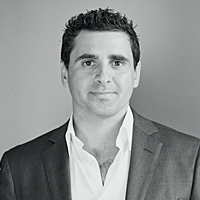Meet Tom: The 22-year-old investing like Peter Lynch, so he can afford a house
What were you doing when you were 22-years-old? I'll spare you my version (for now), but I can assure you I wasn't reading books by Peter Lynch while tweaking the DCF assumptions for small-cap stocks in a spreadsheet. Nor was I lamenting the lack of available investment options for retail investors looking to add some private equity exposure to their portfolio!
For Tom, my fourth guest in Livewire's Meet the Investor Series, you could argue that skyrocketing property prices have made investing an essential rather than an optional past-time. He's taken note and acted on those articles where veteran investors wax lyrical about the power of compounding and starting early.
But Tom is not your stereotypical millennial investor speculating on "stonks" and cryptos. Tom has a process, a plan, and I reckon he'll achieve what he is going for.
I hope you enjoy Tom's story.
Livewire Investor Profile
Name: Tom
Age: 22
Employment Status: Employed / Student
Years Investing: 5
Investment goals: Initially to buy a house but ultimately to create wealth for retirement
Products used: Equities, LICs and ETFs
Biggest portfolio holding: Johns Lyng Group (ASX:JLG)

Image: Tom about to go shredding in Thredbo!
How old are you and how long have you been investing?I'm 22, turning 23 in August. I've been investing for about five years since I graduated high school. I jumped in at the deep end when I first started and made a couple of investments I probably shouldn't have, which I put down to a lack of experience. Once I liquidated those, I sat back for a bit, did some reading and sat on the sidelines just watching how things went. And then last year I took advantage of the correction due to COVID and bought a couple of shares in companies that had looked really good. But the valuations just for me didn't seem to stack up.
The type of companies that I look to invest in is more defensive. I'm very much looking for those with a lot of recurring earnings, where it doesn't matter what's going on in the world around them – they’ll always keep chugging along.
So, when I saw that prices had dropped, in some cases by 20% or 30%, but none of their key metrics had – there were no expectations that their earnings would fall – they looked a lot more attractive. And for some of the companies, their earnings were actually expected to increase. So I thought that given the sort of, circa 20%, 30% correction for some of them that they looked a lot more attractive.
What's your investment objective?
Given my age and the scale of property prices in Sydney, at the moment I'm looking for capital growth to eventually, hopefully, form a deposit for a house. But I’m also getting an early start in building up savings for my retirement, though that’s obviously a long way off. Because as you always hear people say, they wish they'd started investing when they were younger. So, I'm taking heed of that advice and getting started young.
What products do you use to execute your strategy?
Mostly shares. And I think there might be a question about my strategy later, but in creating more diversification, I use things such as listed investment companies and ETFs.
Are there any other platforms or products that you've been using to help you do your due diligence on stocks and other investments?
Given that I am a finance student, I probably have a better than average understanding of financial metrics, in being able to do discounted cash flow calculations and things like that to try and work out value.
So, typically, I do most of my trading through CommSec, that's my broker. Their platform for me is really good, a lot of the information's there for extra detail. But generally, going right to the source, the company reports themselves is hard to beat. I don't necessarily pay for any information or any sort of advice per se – a lot of it is just me sticking to my guns.
Given everything we’ve heard recently about younger investors wanting to use cheap platforms such as Robinhood to trade speculative or “concept stocks,” were you tempted by those at all?
I did go through a phase where I was reading all the articles about the many discount brokers out there, but I gave them the gun. Being a longer-term investor, not a trader, I much preferred having all of the financial data available.
How would you describe your investing strategy?
I’m very high-conviction. I think it may have been Mark Cuban, but someone out there has said that diversification is for idiots.
If I see something I like, I go in all guns blazing. But having said that, I think there is a need for diversification, but within asset classes more broadly.
So my biggest portfolio weighting is within my top four stock weightings, but my fifth-biggest is a private equity LIC. This was quite a recent purchase for me, and it was really about getting some asset diversification in my portfolio.
Can you talk me through those top five positions in your portfolio and why you like each of them?
- Johns Lyng Group (ASX:JLG) - 34%
- Kelly Partners (ASX:KPG) - 21%
- Duratec (ASX:DUR) - 14%
- Lindsay Australia (ASX:LAU) - 11%
- Pengana Private Equity Trust (ASX:PE1) - 10%
Johns Lyng Group (ASX:JLG), which is number one, started off as a dramatic play on the increased frequency of extreme weather events and how I see climate change going forward – particularly how it's going to affect Australia with more bushfires and floods.
But when I really delved into the company, they’re financially very strong, with excellent cash flow and a strategy of acquiring strata management companies and then cross-selling building insurance. I really like that strategy.
Kelly Partners (ASX:KPG) is a combination of really good recurring earnings and a defensive nature at the same time as looking for growth, with a good acquisition strategy in place.
I like the management under Brett Kelly, who holds about 40% to 45% of the shares that are quoted. He also provides monthly communication to shareholders on the progress of the business. The shares also pay monthly dividends, having just started at the beginning of this year. For me, that just reiterates the strength of their cash flow and overall cash position.
Duratec (ASX:DUR) is the next one, which I bought at its IPO around November last year. I may have been a bit early on that one – it’s not my best position at the moment, but for me, the story hasn't really changed. That was once again a thematic play, this time on rising defence spending. The company does a lot of building and restoration works on defence bases.
And there’s also Lindsay Australia (ASX:LAU), which is another defensive position that also has some growth. The company has grown revenue every year for about the last 15 years and is also starting to diversify into higher-margin services.
Outside of that top five, how many positions do you have in total?
I've also got a LIC called VGI Investments (ASX:VG1). And again, that’s about looking for a bit more portfolio diversification. Because I don't consider myself an expert on international and global shares, and because it’s also got some shorting in the strategy, I would rather give my money to someone that knows what they're doing.
What are some of your worst investments during your relatively short time as an investor?
If we’re looking more broadly, my worst investment was buying my own car at age of 20. It’s one of those things that is great to have, but if I had my time over, that money would be sitting in investments.
But in terms of stocks, one of the first bad stock choices I made was Sky Network Television (ASX:SKT). I bought it when I had just finished high school and had some money saved from a part-time job. I’d heard of it before but wasn’t really up to scratch on its financials, so I just sort of dove in.
I think I just managed to break even on that one, but in terms of investments that had no strong investment case behind them, that’s an example.
How do you think about dealing with losing or poor performing positions? What’s your exit strategy for stocks?
For me, it's very much story-based. So, whatever idea I've originally invested in, if that story changes, that's when I would start to think about exiting. Obviously, that's a bit difficult, because, for most companies, you only hear from them twice a year in any great detail.
In the example of Duratech, I’m currently waiting for the full-year report to come out to see how things are going.
Do you have any favourite contributors that you would recommend other investors follow?
I think Marcus Padley is really good. One of the things he said that really changed the way I look at things is the saying that stocks are for growth and go to bonds for income.
I also like Richard Ivers from Prime Value Asset Management. I think mainly because his investment strategy in the way he talks is very similar to my own.
What can Livewire do better or what do you dislike about Livewire?
There's nothing I necessarily dislike. The one thing I would say that could possibly be done better is maybe more content on alternative investment strategies and how retail investors can get access to those. Up until recently I never thought that as a retail investor, I could have access to private equity in any way. And it was just through coincidence that I saw an article mentioning that there was the Pengana Private Equity Trust (ASX:PE1), which is a listed investment company.
Is there a lesson that you've learned as an investor that could potentially help others out there?
Know what sort of investor you are. For me, figuring that out helped me zero in on what information I should be taking in, what I should be ignoring and what sort of stocks I should be looking for.
I think many people get confused and don't know whether they're a speculator, a trader or a long-term investor. Obviously, the types of stocks that a stock trader or speculator is interested in are those that I want to steer clear of.
And to steal Warren Buffett's phrasing - “circle of competence,” – I’m a very concentrated investor, with a lot of focus on industrials. That's a sector that I understand. And that's not to say there aren't excellent stocks in financials, IT or healthcare. But I don't necessarily think that I have enough of an understanding of those industries and those sectors to warrant investing in them.
Now a little bit about you: what’s a personal passion or an ambition you have?
Hopefully, I can get into investment management as a career. I would love to turn my hobby into a career.
I also really enjoy skiing. I didn't get to the slopes last season because of COVID, but fingers crossed I can get down a couple of times this year.
And I’m a big National Rugby League fan. I love the Sharks who aren't having the greatest of luck at the moment. If that team was an investment, I'd definitely be selling, because the story has changed. I'm loyal to a fault with them, but they've been really frustrating more recently.
You've mentioned a few of the super investors throughout this interview, and clearly, you've done some reading. What’s one book that’s really stuck with you, that you think other Livewire readers might enjoy?
Peter Lynch's One Up on Wall Street. The points he makes about looking for good quality businesses, and good management are great. And I also like his emphasis that the most talked-about stocks, those that are most hyped-up, are often not the best ideas.
I think his sceptical approach has rubbed off on me a bit. That's probably why my portfolio is quite highly concentrated and my filters are quite tough because I try to be very strict on myself. You've got to stick to your strategy, and particularly in the long-term, it generally pays off.
Related Articles


Enjoying Livewire's Meet the Investor Series?
If you enjoyed hearing about Tom's experience please give this wire a 'like', and if you know someone that might enjoy the article why not send them the link.
You can see all the interviews in this series by clicking here
3 topics
7 stocks mentioned
2 contributors mentioned


